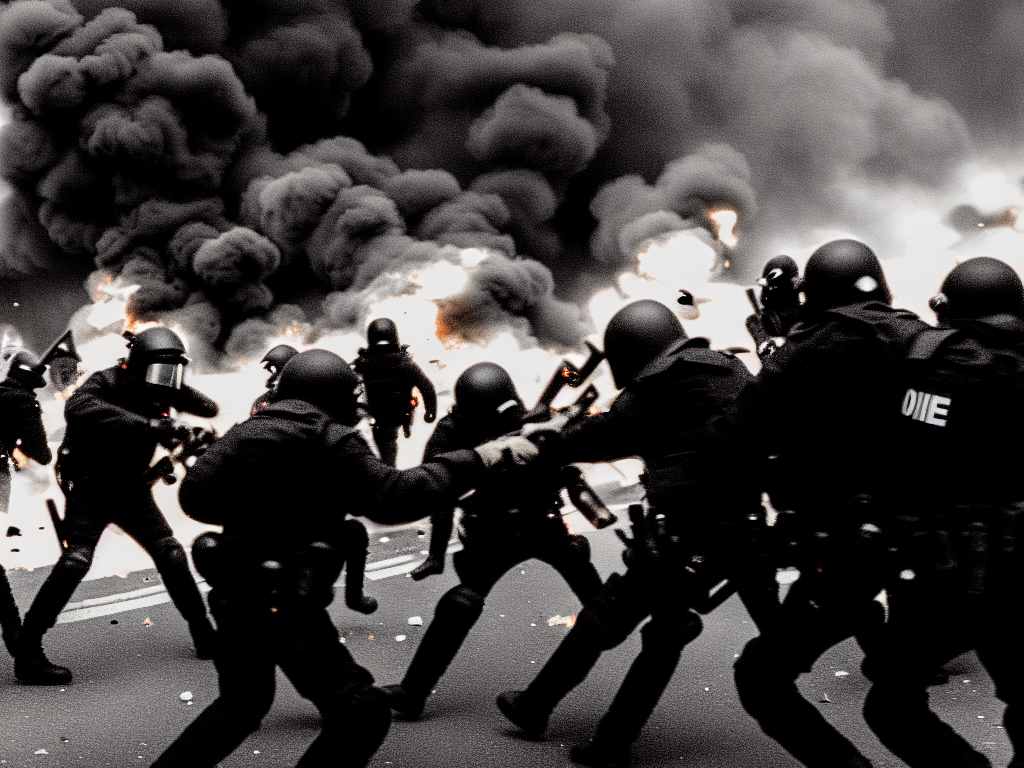- July 16, 2023
America Mission Special Edition: Political Division and Global Surveillance

Guest writer, Jacob Michael King, is the writer/director of CAVIAR, a film that uses deepfake technology to tell a story about propaganda, government conspiracies, and UFOs. CAVIAR is available on Amazon Prime Video and Tubi. His fiction has appeared in Permafrost, Fantasy Scroll Magazine, Buffalo Almanack, and Cactus Heart. For more of his work, visit thelastsitcom.com.
Political Division and Global Surveillance
When the headlines first appeared, you could guess how things were going to play out. Twitter was aflame (though not, admittedly, as fiery as Paris) with media from the riots.
The more prudent among us expressed shock and confusion, acknowledging our ignorance of the situation. Unlike, say, Australia or Canada or the United Kingdom, France’s language and political volatility make it a place many in the English-speaking world (myself included) don’t feel they understand.
The takes, when they came, were predictable. This was an immigration issue. This was a racism issue. This was a question of justice. This is the problem with introducing an alien culture. Our political leanings determined the target of our outrage, but outrage was almost universal.
Those attuned to the machinations of propaganda must have felt the hackles on their necks (not to mention their consciences) tingling. The footage was frightening and brutal. But fear is a political tool: one employed, more often than not, in bad faith.
In the midst of a situation that is admittedly outrageous, it is a gift to hear, beneath all the shouting, a voice of calm. Maajid Nawaz has been a critic of the encroaching global surveillance state since the Bush-era War on Terror. In a post on his Substack, he writes,
“The Globalist state deliberately incites and facilitates tensions between groups so that we end up demanding our own chains.”
The riots in France should be interpreted in the context of analogous events—this playbook is one with which many are familiar, and it’s easy enough to read if you know how.
The Whitmer Kidnapping Plot
In October of 2020, just before the election, when Americans were reeling from the pandemic, the murder of George Floyd, and the widespread political unrest across the country, the FBI arrested thirteen men.
Right-wing extremists had tried to kidnap Governor Gretchen Whitmer, a vocal critic of Trump and an advocate for strict lockdown measures. We’d been told that Trump had emboldened types like these—and, in case we forgot, we were treated to footage of the horrific attack in Charlottesville.
But, like all good fiction, this story wasn’t so simple. Soon, it became clear that a number of federal informants, and even FBI agents, were working with the suspects. According to Reason:
When the group took a nighttime road trip to surveil Whitmer’s summer house, there were two informants and two undercover agents in the cars with them and multiple agents surveilling them, including an agent on Whitmer’s boat dock.
Indeed, a case could be made that, without the planning and goading of the feds, the conspiracy might never have been hatched. Such a case was made, and two of the defendants were acquitted.
The jury was hung on the others, and several convictions ultimately resulted. Perhaps the guilty weren’t legally the victims of entrapment, but Law & Crime provides some unsettling details about the latitude officers are given:
Under the law of entrapment, undercover government agents can suggest nefarious deeds[…] The U.S. Supreme Court and other courts have explained that when defendants exhibit “predisposition” — that is, that they were “ready and willing without persuasion” to commit a crime and were “awaiting any propitious opportunity to commit the offense,” they are not entrapped. […] If a defendant is already on track to commit a crime and an undercover agent merely greases the rails and helps make the crime happen, entrapment does not occur.
[…] “Inducement by law enforcement officials may take many forms including persuasion, fraudulent representations, threats, coercive tactics, harassment, promises of reward, or pleas based on need, sympathy or friendship,” one U.S. Court of Appeals case from the Washington, D.C. Circuit explains. However, a “solicitation, request or approach by law enforcement officials to engage in criminal activity, standing alone, is not an inducement.”
There are plenty of well-meaning citizens who opposed Trump, who believed his critics when they claimed that he represented a threat to democracy. Under such circumstances, one might find some overreach on the part of the FBI to be justifiable.
But once citizens allow their government to behave like this, they pave the way to tyranny.
Before conservative readers blame the left, they should know that there’s plenty of guilt to go around.
The Glow of Terrorism
The Intercept maintains a database of terrorism prosecutions. On this page, we find the following:
Since the 9/11 attacks, most of the 992 terrorism defendants prosecuted by the U.S. Department of Justice have been charged with material support for terrorism, criminal conspiracy, immigration violations, or making false statements — vague, nonviolent offenses that give prosecutors wide latitude for scoring quick convictions or plea bargains.
Very few terrorism defendants had the means or opportunity to commit an act of violence. The majority had no direct connection to terrorist organizations. Many were caught up in FBI stings, in which an informant or undercover agent posed as a member of a terrorist organization. The U.S. government nevertheless defines such cases as international terrorism.
During the War on Terror, we saw plenty of headlines about foiled terrorist plots. We were made to believe that we were under constant threat—that our democracy was imperiled. Thus most didn’t blink at FISA courts or Guantanamo Bay, and didn’t look too closely at those with whom our agencies were nabbing, or how. The authorities, after all, were keeping us safe.
There were, to be fair, voices raised in protest—voices like those of Maajid Nawaz, or the folks at The Intercept. The very tools, critics said, used against presumed terrorists may one day be employed on American citizens. Most of us, I suspect, knew they were right. But we let fear prevail.
Feds All the Way Down
Intelligence agencies have a long and infamous history of playing both sides. Many on the right were outraged, and with good reason, to learn of the extensive FBI involvement in the Whitmer plot. But they were relatively silent at the revelation that those encouraging violence on the left had uncomfortable ties to law enforcement.
Michael Windecker is not, according to The Guardian, the type of fellow who would go unnoticed at most protests:
Windecker, who the FBI paid $20,000 to spy on [BLM] activists, stood out from the crowd. He was white, while most protesters in Denver were African American, and dressed in military fatigues. He drove an ostentatious silver hearse with a boot filled with AR-15-style semi-automatic rifles and other firearms.
He managed to gain the trust of his fellow activists, and led them to increasingly illicit activities. He apparently told one BLM leader that “I can teach you how to shoot a gun, to hand-to-hand combat, all the way up to like blowing up fucking buildings and guerrilla warfare tactics and sabotage.”
Windecker apparently provided $1,500 to one activist to purchase a gun. This activist, unsurprisingly, was later arrested on gun charges.
For someone on the FBI’s payroll—and, we must assume, accountable to them—shenanigans like these ought to raise questions. Windecker, who initially denied being an informant, was caught by a careful journalist. If law enforcement employed these kinds of tactics in Denver, there’s no reason to believe it was an isolated incident.
On the contrary, the Whitmer plot could be seen as part of the same plan. When interpreted in this light, a coherent and disquieting picture emerges.
The Politics of Fear
Let us return to Nawaz’s statement:
The Globalist state deliberately incites and facilitates tensions between groups so that we end up demanding our own chains.
In the midst of widespread unrest, the French authorities authorized an expanded use of drones. While surveillance drones had been used before—during the yellow vest protests, for example—their deployment was relatively limited, and even then was controversial.
In December 2020, French courts banned the use of drones to surveil political protests. Earlier that year, the Council of State would not allow them to aid in the enforcement of COVID policies. The French people have long been wary of encroaching authoritarianism, and the new turn has not been accepted uncritically.
Whether the recent violence was spontaneous, or whether, as with the Whitmer plot or Michael Windecker, some encouragement was involved, the discord—or, more accurately, the fear the discord triggered—has been used as an excuse for the expansion of state power.
As Nawaz points out, the way this fear is generated targets different political demographics—one incident is used to frighten the right, while another leads those on the left to panic. The War on Terror had Republicans advocating for the Patriot Act, while, during the pandemic, we saw Democrats advocating for vaccine mandates and more draconian lockdowns.
If we’re able to separate ourselves from the partisan particulars of such events, we can discern the true purpose of this fearmongering. The manipulation (calculated, cynical, cruel) becomes obvious.
But there is, I think, a cause for optimism in the midst of so bleak a realization. If those in power need to manipulate populations to further their tyranny—if, in order to bind us, they require our consent—then their position is far more precarious than ours.
We can simply refuse. This is easier said than done, no doubt, especially when so few are conscious of the game being played.
But we’re in a different, a better, position to diffuse any information than we’ve ever been.
New channels have opened up, eroding the stranglehold of legacy media,
and voices like Nawaz’s have gained more ears.
Hopefully we’ll all start listening.


9 Comments
Well laid out and thought provoking! Thank you Jake!!!
Thank you, Kimberly!
Jacob, nice job! And Caviar is great !
FBI has a long history of abuses, corruption, & unethical (at the least) to criminal (in many cases) actions going all the way back to the Palmer Raids.
Thank you! I’m so glad you enjoyed it.
And you’re absolutely right.. Frankly, I wonder if their existence was ever justified. If more Americans were able to see how they play both sides, employing political division to secure power, we could see real institutional change.
Jacob, what a thought provoking and inspiring article on global affairs from Washington, Beijing to Paris!
Your articles illustrates not much difference between tyranny & democracy as one is very overt and the other very covert.
Thanks for giving us an insight as bd urgent need to be cognizant of the government infiltration into our very freedoms & dignity.
Thank you, Marvin! Really appreciate your comment. Yes, we’ve got to be vigilant in these matters. So often, outrage is used to divide us. I’m very suspicious of any excuse to restrict civil liberties.
We need to constantly hold our government and those in power to be honest and obey our laws. Corruption will always be an option, but should be appropriately addressed and punished. Our government is supposed to be by the people, for the people. Thank you for reminding us to be watchful of this democracy. We do not ever want to be ruled by a tyrannical dictator or regime! All forms of government at all levels can be and should be questioned as needed. Thank you Jacob King.
Absolutely, Michele! We have to keep a close eye on those in power. They’ve been doing this forever. Thankfully, today we have a more diverse media landscape, which makes it more possible to hold our leaders to account.
[…] Most terrorists died with their victims, and many of those who didn’t were tried in shadowy FISA courts, where no cameras were […]